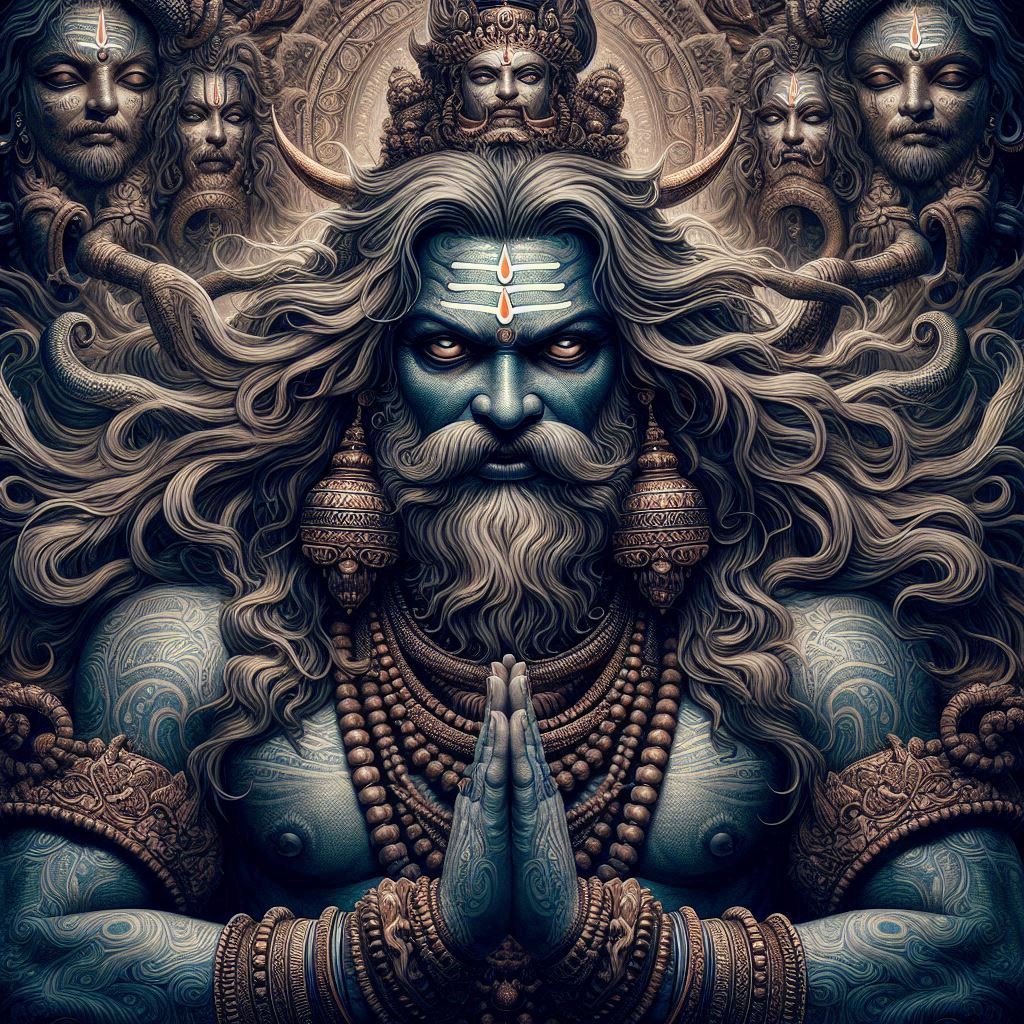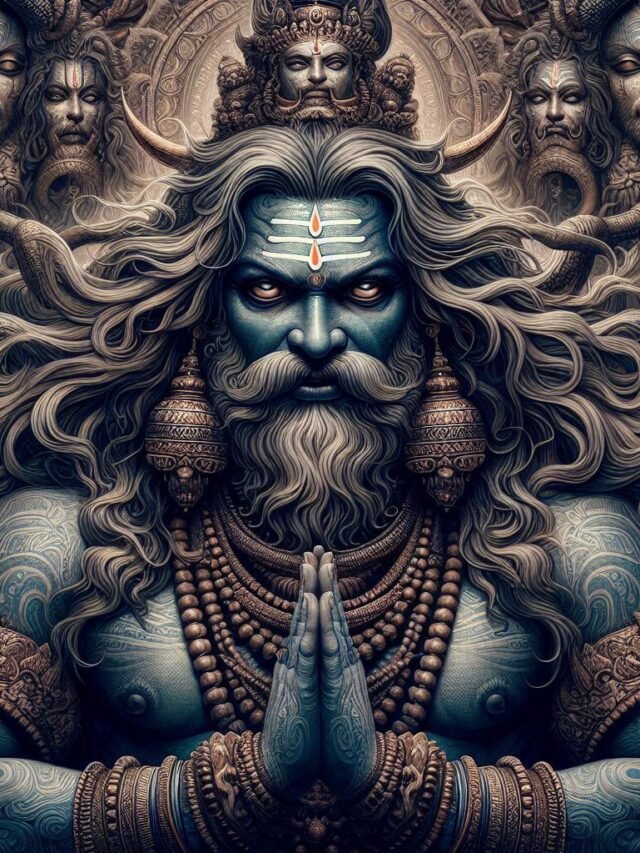The Aghoris are a distinct sect within Hinduism, renowned for their unconventional practices and their pursuit of liberation (moksha) through unconventional means. While they adhere to the fundamental tenets of Hinduism, their interpretation and application of these principles diverge significantly from mainstream Hindu practices.
Central to their belief system is Lord Shiva, particularly his fierce and terrifying form, Bhairava. Aghoris believe that Shiva resides in the cremation ground, a place considered inauspicious by many. They choose this unconventional dwelling as their place of meditation and spiritual practice, defying societal norms and embracing the cycle of life and death.
Aghoris challenge traditional notions of purity and impurity. They believe that everything in existence, from the most sacred to the most profane, is a manifestation of the divine. This philosophy leads them to consume and utilize things considered taboo by mainstream society, such as human remains and discarded offerings.
The Aghori path is demanding and requires immense discipline and detachment. It involves rigorous training under the guidance of an experienced Aghori Guru, who imparts knowledge and initiates them into the practices. This path necessitates renouncing worldly attachments, including family and material possessions.
Aghoris are often misunderstood and feared due to their unconventional practices. However, their philosophy emphasizes the interconnectedness of all beings and the importance of transcending societal limitations in the pursuit of spiritual liberation. More Web Stories.
Key takeaways:
- Unique Path to Liberation: Aghoris seek moksha through unconventional means, challenging societal norms and embracing the cycle of life and death.
- Focus on Shiva: They are devoted to Lord Shiva, particularly his fierce form, Bhairava.
- Embracing the Unconventional: Aghoris embrace the “unclean” and the “impure” as manifestations of the divine.
- Rigorous Path: The Aghori path demands immense discipline, detachment, and adherence to the guidance of their Guru.
- Societal Perception: Aghoris are often misunderstood and face societal ostracism.
Beliefs of the Aghoris: A Path of Liberation
A unique sect within Hinduism, challenge conventional norms and embrace a radical path towards spiritual enlightenment. Their core philosophy revolves around the belief that everything in the universe, from the most sacred to the most profane, emanates from Brahman, the ultimate reality. This implies that nothing is inherently impure; all existence is an expression of the divine.
They view the universe as an interconnected web of life, where all beings are ultimately one. They recognize the human body as a microcosm of the universe, reflecting the diversity and complexity of creation. Their worldview also encompasses a belief in a vast array of spirits and deities, both benevolent and malevolent, inhabiting the universe.
A central tenet of them philosophy is the impermanence of the physical body and the eternal nature of the soul. They believe that by embracing death and decay, they can transcend the limitations of the physical and attain spiritual liberation (Moksha). This belief is reflected in their practice of dwelling in cremation grounds, a place considered inauspicious by many.
Their philosophy is deeply rooted in Shaivism, with a strong emphasis on Lord Shiva as the Supreme Being. They believe that Shiva is perfect, possessing all-knowing, all-present, and all-powerful qualities. Furthermore, they believe that Shiva is the source of all creation, responsible for every cause, condition, and effect in the universe. This implies that everything in existence is inherently perfect, and any attempt to deny this perfection is a denial of the divine.
They believe that every individual soul is inherently divine, a spark of Shiva itself. However, these souls are obscured by eight major bonds (Astamahapasa), including sensual pleasure, anger, greed, obsession, fear, and hatred. Aghori practices are designed to break free from these bonds. They engage in unconventional practices, such as meditation in cremation grounds to conquer fear, and controlled sexual practices to overcome desire, all aimed at liberating the soul and achieving union with the divine (Sadashiva).
Key Improvements:
- Enhanced Flow and Readability: Improved sentence structure and word choice for better flow and clarity.
- Stronger Introduction: The introduction now provides a more engaging and concise overview of Aghori philosophy.
- Focus on Core Beliefs: The focus has been shifted to clearly articulate the core beliefs of Aghoris, such as the interconnectedness of all beings, the impermanence of the physical body, and the divinity of all existence.
- Emphasis on Shaiva Philosophy: The connection between Aghori beliefs and Shaivism has been strengthened.
- Concise and Informative: The article provides a concise and informative overview of Aghori beliefs without unnecessary details.
The phrase “Aghori: A Journey of Liberation” encapsulates the core philosophy and ultimate aim of the Aghori path within Hinduism. It highlights that the often-unconventional and sometimes shocking practices of the Aghoris are not random acts but are deeply rooted in a spiritual quest for liberation (moksha). Let’s elaborate on this concept:
1. The Meaning of Aghori:
The Sanskrit word “Aghori” itself is significant. It is derived from “Aghora,” which has several interpretations:
- Not dreadful/Fearless: This refers to the Aghori’s ultimate state of being, one that has transcended fear, aversion, and societal taboos. Through their practices, they aim to confront and overcome the limitations of the ego and the dualities of life.
- Non-dualistic: It is often adhere to a non-dualistic (Advaita) philosophy, seeing the divine (Shiva) in everything, without distinction between pure and impure, good and evil. This understanding is key to their journey of liberation.
- Simple/Uncomplicated: In some contexts, “Aghora” can also imply a state of simplicity and naturalness, reflecting the it’s detachment from societal complexities and their embrace of a primal existence.
2. The Journey Aspect:
The path of an Aghori is not a sudden transformation but a rigorous and often lengthy “journey” (Sadhana) involving:
- Renunciation: Aghoris renounce worldly attachments, social norms, and often their past identities.
- Guru-Disciple Relationship: The guidance of a Guru is crucial in navigating the challenging Aghori path. The Guru imparts specific practices, mantras, and esoteric knowledge.
- Intense Practices: Aghori Sadhana often involves practices that challenge conventional Hindu norms and societal taboos. These can include:
- Living in cremation grounds: Embracing death and the impermanence of life to overcome fear.
- Smearing cremation ashes: Symbolizing detachment and the ultimate reality of the physical body.
- Using human skulls (Kapalas): As bowls for eating and drinking, signifying the acceptance of all aspects of existence.
- Meditation on corpses (Shava Sadhana): A powerful tantric practice to confront fear and gain spiritual power.
- Consumption of substances considered impure: To break down notions of purity and impurity and realize the divine in everything.
- Confronting Dualities: A central aim is to transcend the dualities of like and dislike, pleasure and pain, good and evil, ultimately realizing the oneness of all things as manifestations of Shiva.
3. Liberation (Moksha): The Ultimate Goal:
For an Aghori, the ultimate aim of this intense journey is liberation (moksha) from the cycle of birth and death (samsara). They seek to realize the true nature of the Self (Atman) as identical to the eternal and formless Absolute (Brahman), often identifying this with Lord Shiva.
- Breaking Free from Illusion: Aghori practices are intended to break free from the illusions (Maya) of the material world and societal conditioning.
- Achieving a State of Fearlessness: By confronting death, impurity, and societal taboos, Aghoris aim to attain a state of profound fearlessness and detachment.
- Realizing the Divine Within: The journey is about recognizing the divine presence in all aspects of existence, leading to a state of liberation where all distinctions dissolve.
The Aghoris are a mysterious and fascinating group of ascetics who practice a unique form of Hinduism. Known as the “holy men of the dead,” they are notorious for their bizarre rituals and unconventional practices. Despite their unusual ways, the Aghoris are considered to be highly spiritual and are revered by many Hindus.

